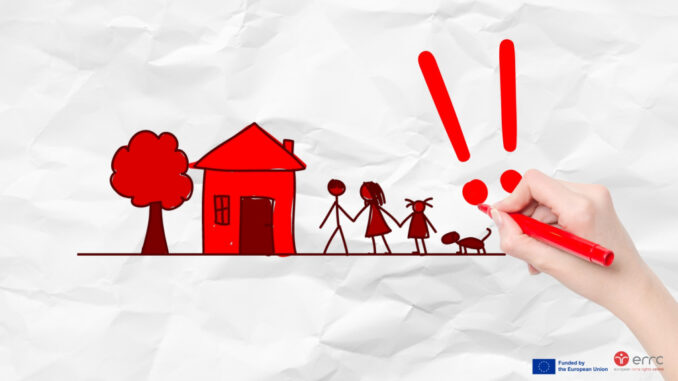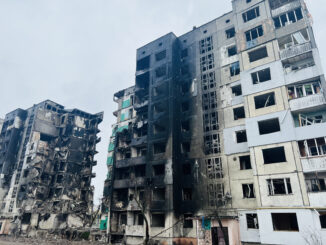
A Romani family who were evicted from the ‘La Barbuta’ segregated Romani camp in September 2021 have brought a civil lawsuit against the Municipality of Rome for its failure to take positive actions to end housing segregation and provide them with adequate alternative accommodation following the closure of the camp. The case, which is now pending before the Civil Court of Rome, was brought under the anti-discrimination law, and is represented by the European Roma Rights Centre (ERRC).
“This case highlights an ongoing issue across Italy concerning the process of ‘overcoming the system of camps’” said the ERRC’s President, Đorđe Jovanović. “The closure of segregated ‘nomad camps’ without any viable plans for adequate alternative accommodation results in the creation of countless informal camps of vulnerable Romani families who have nowhere else to go, and who are subject to repeat evictions and denial of their basic rights to things like education, family life, water, public infrastructure, and social assistance.”
‘La Barbuta’ camp was officially closed on September 23, 2021. The closure left many Romani families homeless, with no alternative accommodation, and forced others to accept substandard housing, resulting in overcrowded and dilapidated living conditions. The camp was initially opened by local authorities in 2012 as part of a government initiative to house around 650 Romani people in segregated areas. ‘La Barbuta’ was not only a place of ethnic segregation but also of inadequate housing conditions. Families lived in 24 m2 containers and the camp was isolated from other neighbourhoods, close to Ciampino airport. Despite a 2011 Council of State ruling and a 2013 judgment from the Supreme Court of Cassation declaring such practices illegal, the camp continued to operate, subjecting residents to substandard living conditions and isolating them from essential services.
The discriminatory nature of the camp had already been highlighted by the Civil Court of Rome in 2015 in a case brought by Associazione 21 Luglio and Associazione per gli Studi Giuridici sull’Immigrazione. The organisations brought an antidiscrimination action before the Court in 2012 to challenge the existence of the camp as discrimination. The ERRC intervened in the case to support the two organisations. It was the first time that a court recognised that building segregated housing for Roma on the deprived outskirts of large cities amounts to racial segregation.
Despite policies adopted over the years by the Municipality of Rome, including provision of some social housing and rental vouchers, the conditions in the camp were left to deteriorate and many did not receive an offer of alternative accommodation. In 2021 there were still around 60-70 people living in the camp when the Mayor of Rome, Virginia Raggi, signed an eviction order on the grounds of public health just a month before the mayoral elections.
The ERRC urges local authorities to correct their mistakes of the past by providing sustainable housing alternatives, employment access pathways, and access to education for Romani people who have been abandoned and then evicted from ethnically segregated ‘nomad camps’.
Background to segregated ‘nomad camps’ and forced evictions in Italy
Italy’s practice of placing Romani people in segregated housing began around the 1960s but was further solidified by the policies of the 2008 ‘nomad emergency’ (when the Silvio Berlusconi’s government issued a state of emergency and implemented draconian, anti-Roma policies). The formalised creation of government-run ethnically segregated ‘nomad camps’ has been a thing of the past since 2018, but their legacy lives on. Italy’s promises to ‘overcome the system of camps’ since 2012 have resulted in local authorities abandoning responsibility for maintaining their camps, with very few actually being shut down. Most of the formal camps that have been closed have come at the cost of hundreds and thousands of people made homeless by mass forced evictions. In 2023 there were still at least 119 segregated camps and shelters (housing approximately 13,300 people) operated by local authorities in Italy, according to estimates by Associazione 21 Luglio. A further 2,500 Roma are estimated to live in ‘informal camps’, many because of previous evictions of local-authority-run ‘nomad camps.’ Between 2017 and 2021, the ERRC has documented at least 187 evictions of Romani communities in Italy affecting more than 3000 people.
This press release is also available in Italian.
redaktionen@dikko.nu
Att vara en oberoende tidning kostar pengar därför använder vi oss av crowdfunding. Det innebär att människor med små eller stora summor hjälper till att finansiera vår verksamhet. Magasin DIKKOs insamlingen sker via swish: 123 242 83 40 eller bg: 5534-0046
Vill du annonsera eller sponsra, synas eller höras i våra media?
Kontakta oss på redaktionen@dikko.nu eller ring 0768 44 51 61
IBAN: SE19 9500 0099 6042 1813 4395
BIC: NDEASESS




